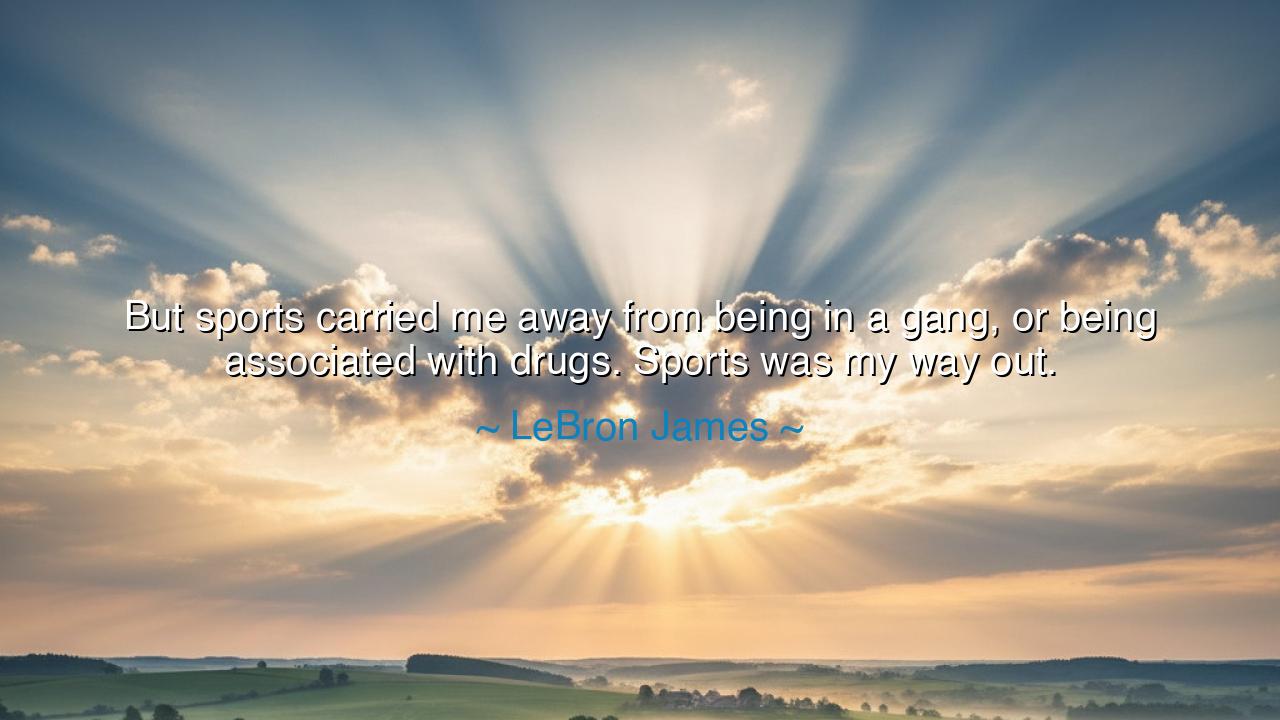
But sports carried me away from being in a gang, or being
But sports carried me away from being in a gang, or being associated with drugs. Sports was my way out.






LeBron James, the titan of the hardwood, once confessed with striking candor: “But sports carried me away from being in a gang, or being associated with drugs. Sports was my way out.” In this testimony lies the cry of one who stood at the crossroads of destruction and destiny. His words are not merely about the game of basketball, but about salvation, about how sports can become a ladder by which the young rise from despair to hope, from chaos to order, from ruin to greatness.
At the heart of his saying is the power of discipline and direction. A boy without guidance may fall prey to the snares of gangs or the poison of drugs, for the streets are always ready to claim the wandering soul. But sports demand order—practice, repetition, patience, endurance. In that structure, LeBron found a path away from darkness. His ball, his court, his sweat—these became the armor that shielded him from the snares that had claimed so many around him. To pick up the game was to put down destruction.
History is filled with others who tell this same tale. The great Jackie Robinson, born into hardship, found in sports not only refuge but strength, discipline, and a platform to fight for justice. Likewise, countless young men and women across generations have escaped the traps of poverty and crime through the structure of athletic pursuit. The playing field is not merely a place of games; it is a sanctuary where the lost find purpose and the broken discover healing.
LeBron’s reflection also reveals the transformative power of passion. To play is not only to escape danger, but to discover joy. He was not merely running from gangs—he was running toward something greater: the thrill of the game, the unity of team, the triumph of victory. In this way, sports do more than shield; they ignite the soul. They replace destructive desires with noble ones, turning anger into energy, loneliness into brotherhood, despair into hope.
Yet his words are also a reminder of the world’s cruel inequalities. Why should a boy have to fear gangs, or drugs, or violence at all? Why must salvation come only through the narrow escape of sport or art? LeBron’s story is both inspiring and tragic: inspiring because he overcame, tragic because so many never find their way out. His testimony calls us to remember that for every star who escapes, there are countless others left behind. Thus, his words are not just about personal triumph—they are a challenge to us all to build better roads for the young.
The lesson, then, is this: find your way out. For some it will be sports, for others art, for others study or service—but all must find the thing that carries them away from destruction and toward creation. And when you find it, cling to it with all your strength. Let it be your sanctuary, your discipline, your guiding light. Do not let the snares of the world claim you, but rise upon the wings of your passion, as LeBron rose from the streets to the stars.
So I say to you: remember LeBron’s words. Look upon the court, the field, the track—not merely as places of play, but as sacred ground where destinies are forged. Seek out your refuge, your discipline, your passion, and let it carry you. For the world is filled with snares, but also with ladders. And if you take hold of the right ladder, with courage and with perseverance, you too may climb beyond hardship, beyond danger, into a life of greatness and meaning.






AAdministratorAdministrator
Welcome, honored guests. Please leave a comment, we will respond soon